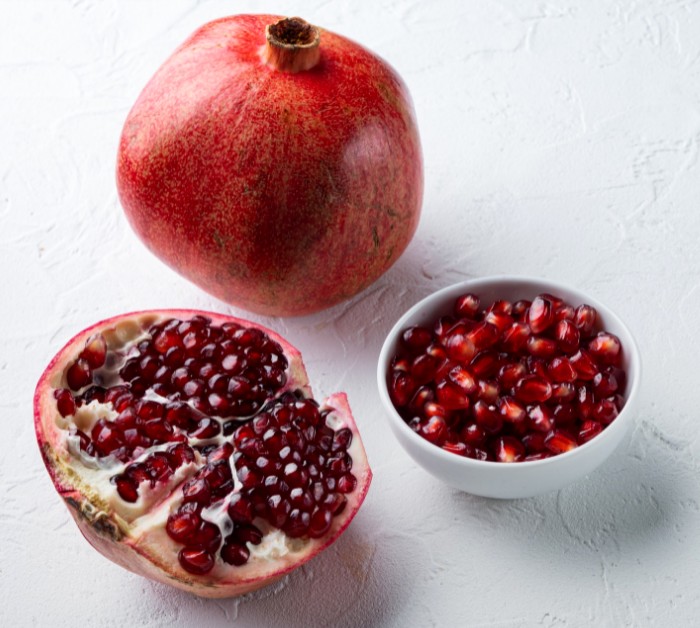Why should you eat pomegranate seeds and what are the best ways to add them to your diet?
One type of edible seeds that you should incorporate into your diet is pomegranate seeds. Rich in vitamins, antioxidants, and fiber these seeds can be eaten raw or added to meals to give them special flavor and color.
Here in this post, we will show you what are the benefits of eating pomegranate seeds, the best ways to get them out, and some tips on how to add them to your diet.
Before we start here are some interesting facts about pomegranates:
- The word pomegranate means apple with many seeds.
- Pomegranate trees can live for over 200 years.
- One pomegranate can hold over 1.000 seeds.
- In Ancient Greece and Rome, pomegranate symbolized fertility.
- In Ancient Rome, pomegranate juice was used to cure infertility.
- Pomegranate juice is the source of grenadine syrup, which is used in a nonalcoholic drink known as Shirley Temple.
This post may contain affiliate links, which means we may receive a small commission, at no cost to you, if you make a purchase through a link. For more information, please see our disclosure.
What are pomegranate seeds?
Pomegranate is a fruit a size of a large orange with thick skin which ranges in color from brownish-yellow to deep red. Breaking through that thick skin to get to the juicy ruby-red seeds known as arils ( a name that includes the seed and juice around it ) is worth the effort because these seeds are so healthy and many benefits lie within.
The inside of the pomegranate fruit contains chambers of hundreds of arils. These arils consist of juicy, brilliant-red fruit surrounding tiny, crisp edible seeds.
These arils inside the pomegranate are what we commonly refer to as “pomegranate seeds“. They are typically eaten raw or processed into pomegranate juice and pomegranate seed oil which helps soothe dry skin, reduce the appearance of wrinkles, and improve collagen production and skin elasticity.
Pomegranate seeds nutrition
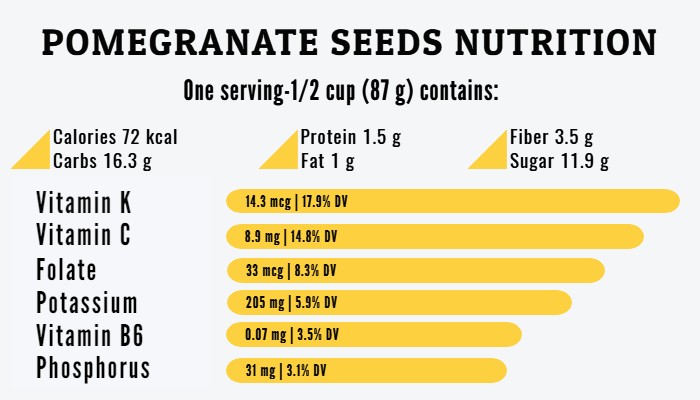
As we can see from the nutrition facts, pomegranate seeds are a great source of several nutrients including vitamin K, vitamin C, folate, and potassium. Plus they are also low in calories which makes them a delicious and ideal snack for anyone watching their weight.
Pomegranate seeds are also rich in fiber, the main types of fiber are cellulose and lignin. The majority of that fiber is found in the white seeds hiding beneath the pockets of juice.
Like all fruit components, pomegranate seeds contain antioxidants. However, they are not as rich in antioxidants as the arils. The seeds contain various phenolic acids and polyphenols including flavonoids, tannins, and lignans.
Now when we know that pomegranate seeds are a great source of nutrients and vitamins, let’s see why these tiny, juicy red seeds are good for you and how to add them to your diet.
Are pomegranate seeds good for you?
The simple answer is YES. The pomegranate seeds are good for you and we will show you here why you should eat pomegranate seeds.
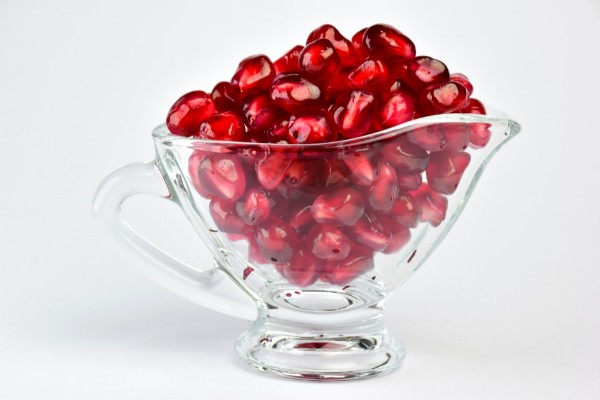
Antioxidants
Pomegranate fruit and its juice are full of antioxidants. Pomegranate juice contains both seeds and arils, therefore whether you eat pomegranate seeds or drink the juice you’ll get a large dose of vitamins and antioxidants.
Here is an interesting scientific fact. According to a review published in Advanced Biomedical Research pomegranate juice has higher antioxidant levels than red wine and green tea. This high number of antioxidants helps protect the body against inflammation and free radical damage.
Lower your blood pressure
Pomegranate seeds can help to keep your blood pressure low, but keep in mind that they are not a miracle cure and can’t replace medications. A review published in Frontiers in Pharmacology assessed the vasculoprotective effects of the pomegranate fruit.
The results showed that the phytochemicals and antioxidants in this food help protect against hypertension and its complications.
Also, a 2013 study reported that consumption of pomegranate juice could decrease systolic and diastolic blood pressure by 6% and 7% respectively in those with high blood pressure.
Improve heart health
The juice made from pomegranate seeds contains higher antioxidant levels than many other fruit juices, which could help block the buildup of cholesterol in the arteries for those at risk of heart disease.
Along with lowering the levels of bad cholesterol in the body, eating pomegranate seeds ensures that the lining of the blood vessels is strengthened and thus heart health is restored.
Eating pomegranate seeds each day keeps cardiovascular problems away and also reduces the risk of strokes and attacks.
Natural aphrodisiac
This is one of the best pomegranate seeds benefits. In many cultures, pomegranates have been associated with fertility and abundance because of their many seeds.
However today some recent studies like the study from Queen Margaret University found that consumption of pure pomegranate juice increased salivary testosterone levels by an average of 24% which can lead to heightened mood and increased sexual desire.
Fight bacterial infections
Since ancient times pomegranate extracts have been used to treat several conditions including microbial infections, diarrhea, hemorrhages, and respiratory infections.
Another thing why pomegranate seeds are good for you is that they stimulate the beneficial bacteria in the gut which could enhance their ability to fight bacterial infections. This is based on research published in Evidence-Based Complementary and Alternative Medicine.
Provide a natural glow on your skin
The antioxidants in pomegranate seeds not only destroy the free radicals but also help to clean the skin and remove toxins and dirt. Applying the juice from these seeds to your skin can lighten your complexion, tighten your skin, and also makes it look young and fresh.
Pomegranate juice is also a great source of vitamin C which when applied topically can improve skin texture and brightness. Consuming pomegranate seeds each day ensures flawless and clean skin as well as adds a glow that you love.
How to remove pomegranate seeds
When it comes to deseed the pomegranate it does take a bit of work but once you get the hang of how to do it, the payoff really is worth it.

Here is the best way to get pomegranate seeds out:
- Roll the pomegranate fruit around to loosen the seeds.
- Score around the middle of the fruit with a sharp knife and tear it open into two halves.
- Hold one half over a bowl, seeds facing down, and tap the skin with a wooden spoon, squeezing a little to release the seeds.
- Do the same thing with the other half.
- If there are a few stragglers among the white pith, you can simply remove them with your fingers or a spoon.
Tips for removing pomegranate seeds
When scoring the fruit don’t cut through into the seeds, just the skin. Pomegranate juice is staining and has a tendency to squirt out. Submerging the fruit in water will stop the spray.
There is an easier way to remove pomegranate seeds without making a mess. You can order it here from Amazon the pomegranate seeds removal tool.
This tool will help you to remove the pomegranate seeds in less than 2 minutes without the frustration of a splashy mess.
Can you freeze pomegranate seed?
Yes, you can freeze pomegranate seeds and if you do that properly you can enjoy these tiny juicy red seeds all year round.
First, you need to open the pomegranate and remove the seeds. After that, you need to rinse and dry the seeds. Once you rinsed and dried the arils to freeze the pomegranate seeds you’ll need to line a baking sheet with parchment paper and spread them out in a single layer, not touching each other.
This step is very important, you need to freeze each aril individually in order to keep them from clumping together into one large ball. This should take 30 minutes to 1 hour.
Once they are frozen you can gather them together and place them into a freezer-safe Ziploc bag. Try to keep as much air out of your chosen storage to prevent ice crystals from forming on or around seeds.
Frozen pomegranate seeds should be used within 6 months of freezing for best results.
Easy ways to add pomegranate seeds to your diet
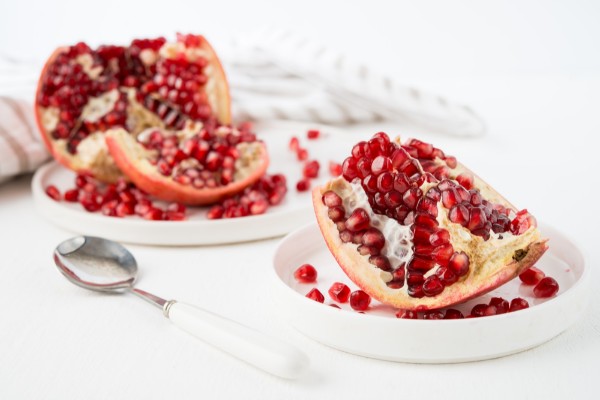
Before adding pomegranate seeds into your recipes or eating them raw here are some tips to get the most out of your pomegranate experience:
Choose the right ones – Choose a ripe fruit, it is easier to remove the seeds from ripe fruit and they taste better too. The fruit should be heavy and the skin should be firm. Small scratches on the surface don’t affect the fruit inside, so don’t judge the pomegranate by its scarred skin!
Only eat the seeds – The white pithy part is safe to eat but it’s bitter and most people choose to discard it. The skin is technically edible but generally used in extract and powdered forms.
The best way to eat pomegranate seeds is to eat them raw and they are simply perfect and delicious all on their own. But if you want to incorporate them into your next meal here are some ways you can enjoy your pomegranate seeds:
- Sprinkle some seeds on your oatmeal or yogurt
- Toss them into a fruit or green salad
- Add them to smoothies
- Garnish grilled or roasted meat with these seeds
- Add them to cocktails, sangria, or mocktails
Here is another interesting way to eat pomegranate seeds and reap all the benefits without removing them from the pomegranate fruit. You can use dried pomegranate seeds also known as anardana.
They can be grounded into powder and sprinkled over your favorite dishes for an added dose of color and flavor. You can try these dried pomegranate seeds made from the dried seeds of wild pomegranates. When ground it’s perfect in chutneys, relish, and spice rub for meat and seafood.
Common questions and answers
Q: Can dogs eat pomegranate seeds?
A: Technically the pomegranate seeds are not poisonous to dogs the way some other foods are. Due to the tannins present in pomegranate seeds some dogs may experience extreme digestive distress that can result in vomit and diarrhea. So keep the pomegranates away from your dog!
Q: What kind of name is “pomegranate”?
A: Often misspelled as “pomegranite” or “pomagranate“, the name pomegranate derives from the Middle French “pome garnete” which means “seeded apple“. It is sometimes referred to as a Chinese apple. The pomegranate’s botanical name Punica Granatum translates as “apple with many seeds”.
Q: How should I store pomegranates?
A: At room temperature and away from the sun you can keep whole pomegranates for several days and up to 3 months when refrigerated in plastic bags.
Pomegranate seeds (arils) can be refrigerated for up to 3 days. Frozen in airtight containers can last for 6 months. Pomegranate juice can be refrigerated for up to 3 days. Freeze up to 6 months.
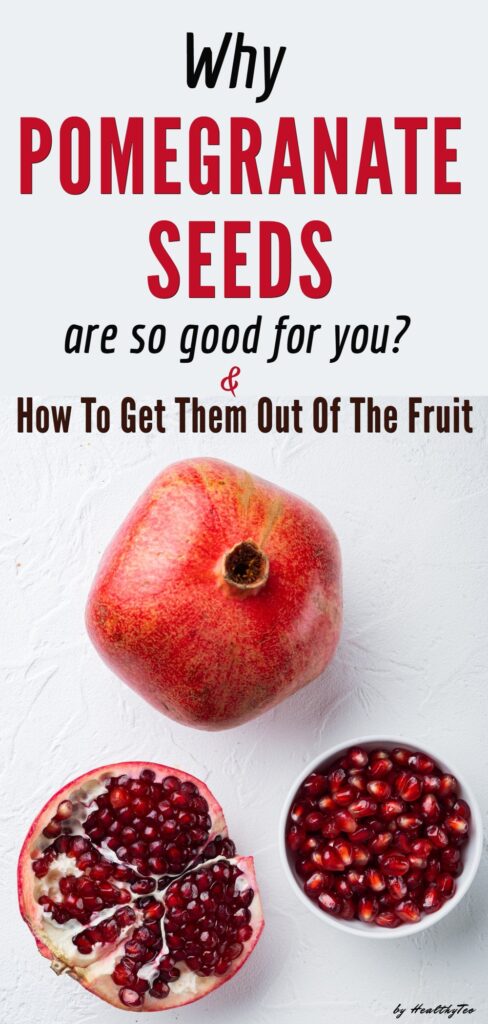
Pomegranate seeds benefits and how to eat them – final thoughts
Pomegranate seeds are not just delicious but they are also good for your health. Rich in antioxidants, may help lowering blood pressure, improve heart health, can be used as a natural aphrodisiac and so much more that we’ve explained in our section: are pomegranate seeds good for you!
Maybe it seems difficult to get them out from their layer inside the fruit, but we’ve shown you up here that it is easy if you know how to do that.
The best thing is that you can eat them raw or freeze them and use them on any other occasion to give your meals special color and taste. Also, you can use the arils to make pomegranate juice which is very refreshing and tasty.
Pomegranate seeds are generally safe for most healthy adults. If you have underlying health conditions or taking prescription medications be sure to consult with your doctor to prevent negative side effects.
Related articles
Different Types Of Edible Seeds That You Should Add To Your Diet

